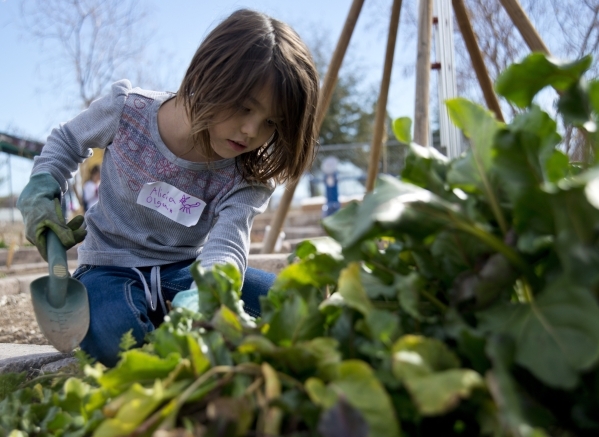Cooperative Extension program sows seeds of knowledge for young gardeners
If your garden has a pest problem, 9-year-old Julia Olguin may be able to tell you whether the insects are good or bad for your plants.
Julia and several other children were studying the seven insect classifications Feb. 13 while taking part in the University of Nevada Cooperative Extension's Junior Master Gardener program.
"Some can be pests, and there's a bunch of bugs around the world," Julia said during the program's first session at the Lifelong Learning Center, 8050 Paradise Road. "There's a lot that are in the garden that are good, but some are bad."
Classes also kicked off Feb. 6 at the Research Center & Demonstration Orchard in North Las Vegas, 4600 Horse Drive, for residents in the north valley. Fifteen children are taking part in that program, and 10 are taking part in the one at the Lifelong Learning Center for south valley residents. The youths are learning about insects, plant diseases, vegetables and herbs.
Participants at the Lifelong Learning Center first took part in a craft — they made a booklet of flashcards about insects — and then headed into the garden to check on crops and plant new ones.
"Don't step on anything," 8-year-old Samantha Martinez yelled as the youths walked around the nine raised garden beds.
The group also included Master Gardeners and children who had completed the junior program and returned to volunteer.
Grains, lettuce, cabbage, broccoli, cauliflower, Brussels sprouts, peas, peanuts, cotton, onions and garlic were among crops scheduled to be grown. Meanwhile, participants harvested beets and spinach while receiving directions from Karyn Johnson, the extension's community-based instructor.
"It looks like one kind of beets went crazy and the other ones didn't grow at all, but look at all our leafy greens that are coming up," said Johnson, who also is the Cooperative Extension's school gardens coordinator for its Food for Thoughts program.
"I want to harvest," 9-year-old Kashmala Hallman yelled.
The Junior Master Gardener program is for youths ages 7 to 12 and consists of four semesters with eight sessions apiece. Every semester, participants receive pins and certificates. Classes are held twice monthly, and community service components follow each chapter that participants complete.
"They get a lot of exercise; they get outside and learn how good food grows; they do some good things for their community; and they learn how plants and the environment work," Johnson said. "We like them to be at least in the second grade and beginning to write because there's some reading and writing involved. They do some stuff at home, and they do some stuff in the classroom."
Kate Payne, a program volunteer whose 13-year-old son, Cole, completed the program last December, said he has since done some planting at their home, as well as work with worm castings for a Clark County 4-H Youth Development project.
"It definitely made him think more about how hard it is to get things to grow; our climate is tricky," Payne said.
Johnson said that's one of the program's goals: teaching children where food comes from and how to grow it effectively.
"Food doesn't just magically appear," Johnson said. "It has to be nurtured and cared for in order to grow. Kids have no exposure now to it. They have no idea where their food comes from."
Those who wish to participate in the Junior Master Gardener program's current sessions have until March 12 to register, and the cost is $52. Scholarships are available for those who qualify. Another series of sessions is planned from June through August, with registration starting May 1.
To register, contact Johnson at 702-257-5523 or johnsonk@unce.unr.edu. For more information on the program, visit jmgkids.us.
— To reach Henderson View reporter Cassandra Keenan, email ckeenan@viewnews.com or call 702-383-0278. Find her on Twitter: @CassandraKNews.
Junior Master Gardener program
Those who wish to participate in the Junior Master Gardener program’s current sessions have until March 12 to register, and the cost is $52. Scholarships are available for those who qualify. Another series of sessions is planned from June through August, with registration starting May 1.
To register, contact Karyn Johnson at 702-257-5523 or johnsonk@unce.unr.edu. For more information on the program, visit jmgkids.us.

























